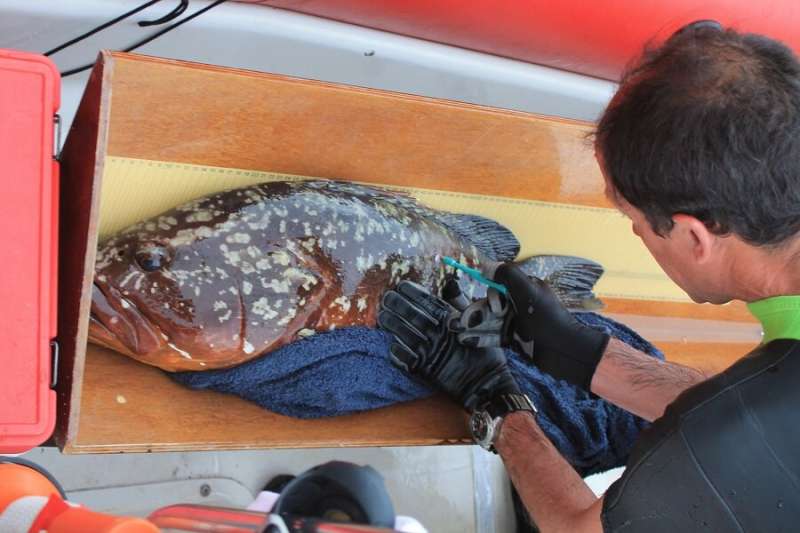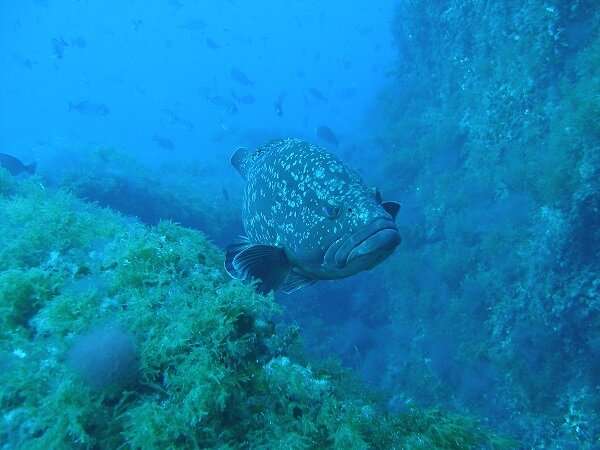This article has been reviewed according to Science X's editorial process and policies. Editors have highlighted the following attributes while ensuring the content's credibility:
fact-checked
trusted source
proofread
Marine reserves unlikely to restore marine ecosystems, say researchers

Protected marine areas are one of the essential tools for the conservation of natural resources affected by human impact—mainly fishing—but are they enough to recover the functioning of these systems?
A study published in the ICES Journal of Marine Science, led by researchers from the Biodiversity Research Institute (IRBio) of the University of Barcelona, in collaboration with researchers from the Group of Ecosystem Oceanography (GRECO) of the Oceanographic Center of the Balearic Islands, highlights the limitations of marine reserves in restoring food webs to their pristine state prior to the impact of intensive fishing.
"This study shows that with only the small-scale marine reserves, it is not enough to conserve the functionality of marine ecosystems. In areas with an intense fishing pressure, both professional and recreational, exploited areas have more influence on small reserves," says lecturer Luís Cardona from the Department of Evolutionary Biology, Ecology and Environmental Sciences of the Faculty of Biology and IRBio, and first author of the article.
Study on carnivorous fish from shallow rocky sea bottoms
Through underwater visual censuses, the researchers analyzed the number and size of carnivorous fish living on shallow rocky bottoms in the Mediterranean Sea and in temperate areas of the Atlantic Ocean with the aim of assessing the effects of protection from fishing in marine reserves. They later used the technique of stable isotope analysis of carbon and nitrogen to see whether there had been a change in the diet of the species and, thus, in the food web.
In the Mediterranean, the samples were obtained in the Cabrera National Park (Majorca) in areas where this activity has been banned since 1991. These samples were compared to those from the west side of Majorca, where this activity is allowed. On the other hand, the samples from the Atlantic were obtained in the Cies Islands, a small archipelago that belongs to the Atlantic Islands of Galicia National Park, where certain types of fishing have been prohibited since 2002 (except for small-scale artisanal fishing), and other areas in the mouth of the adjacent Ria de Vigo, which are open to all fishing.

Effects on number and size of fish, but not on trophic structure
The results show a larger biomass and size of carnivorous fish from shallow rocky bottoms in the analyzed marine reserves compared to areas open to fishing. The most extreme examples were the dusky grouper (Epinephelus marginatus) in the Balearic Islands and the sargo (Diplodus sargus) in Galicia, since the individuals larger than 45 cm, as in the first case, and 26 cm, in the second case, could only be found in the protected areas.
Apart from the positive effects, the study shows that the protection of fishing did not cause any significant change in the trophic structure of the carnivorous fish community in any of those two regions, although there were some changes in the diet of some species.
According to the researchers, this indicates that the effects of the marine reserves in the Mediterranean Sea and the northeastern areas of the Atlantic Ocean are "insufficient to help reconstruct the populations of some carnivorous fish and restore the size structure, as well as to provoke changes in the diet of certain species, but they are unlikely to induce the recovery of the trophic structure of pristine ecosystems prior to the intensification of fishing."
The impact of the absence of sharks, dolphins and seals
These results can be explained by the lack of large carnivorous fish and other highly mobile species, such as seals and coastal sharks, which are at the top of the food chain and have been affected by human exploitation.
"Marine reserves favor the recovery of species such as the dusky grouper, but not other highly mobile and large species such as sharks, dolphins and seals. Even species such as the sea bass have problems recovering in Galicia's marine reserves. The lack of these species is what prevents the emergence of differences in food webs between reserves and areas open to fishing, in the Mediterranean and the Atlantic, beyond the recovery of the biomass of some sedentary species," says Luís Cardona.
As a result, according to the researchers, the aims of the marine networks in regions where mobile predators have been depleted or have become extinct have to be rethought in "more realistic terms than the recovery of pristine conditions prior to intensive fishing, although in marine reserves, some of the characteristics of the historical trophic structure, such as biomass and size structure of certain sedentary species, can be recovered."
In this sense, Luís Cardona thinks the focus of the future conservation of marine ecosystems regarding fishing has to be on "reducing the impact on highly mobile and large species in the areas that are open to fishing, since marine reserves alone can do little to protect these species."
However, the researchers note that the situation could be different in areas where human pressure has been lower and where there is still part of the original diversity of larger and highly mobile carnivorous fish, such as in the north-eastern Pacific Ocean, where populations of most of these species remain in good conditions thanks to the conservation measures applied throughout the territory.
More information: Luis Cardona et al, Effects of fishing on the trophic structure of carnivorous fish assemblages from shallow rocky bottoms of the Mediterranean Sea and the temperate Atlantic Ocean, ICES Journal of Marine Science (2022). DOI: 10.1093/icesjms/fsac229
Provided by University of Barcelona




















